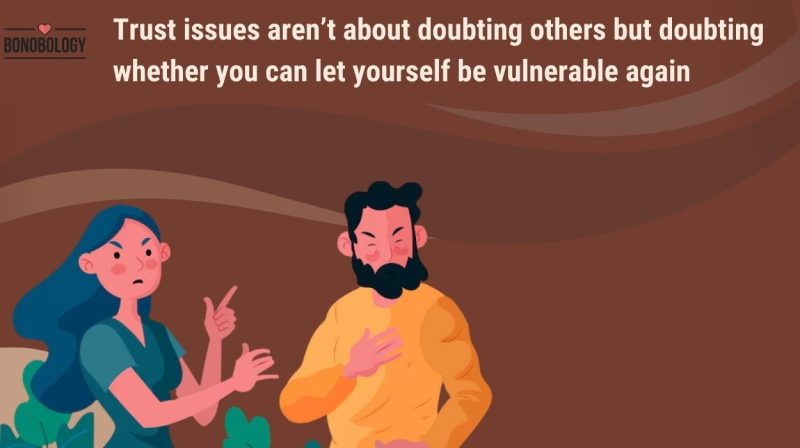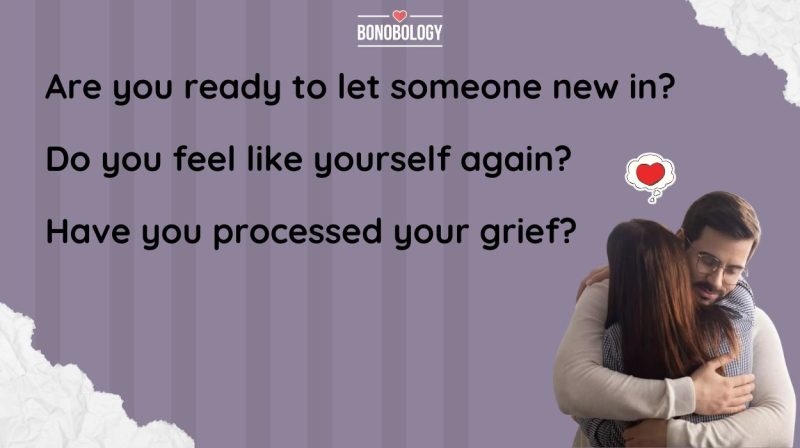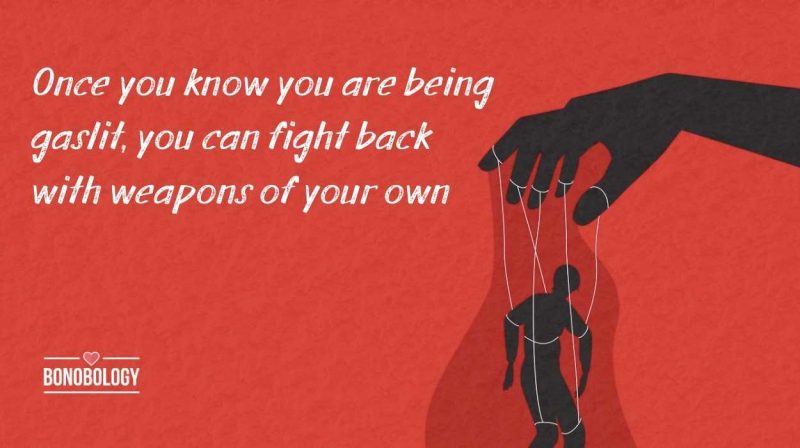Has past infidelity in your relationship left you incapable of trusting your partner? Do you snoop on your partner often, second-guessing their motives, and their explanations never seem to put you at ease? Do you imagine worst-case scenarios at the slightest hint of trouble in your relationship and start looking for a way out? Well, these are some telling signs you have trust issues that need to be tackled soon.
A lack of trust in a relationship while troublesome in itself, it’s also a symptom of deeper issues that may be plaguing your bond. For instance, if you have been cheated on, lied to, hurt, or abandoned by your current or previous partner, or even someone close to you (like a parent who you trusted to protect you but didn’t), trust may not come naturally to you anymore.
You may be skeptical of those around you and tend to flee situations. For instance, the moment a romantic connection starts turning serious, instead of feeling happy and safe, you start to feel scared and look for ways to protect yourself from getting hurt again. This can get in the way of forming enduring relationships you can bank on, leaving behind a trail of fleeting connections—each of which further triggers trust issues.
Naturally, this can become an emotionally draining vicious cycle. So, how do you break free from it? We’re here to help you figure out by addressing what an inability to trust looks like, what causes trust issues, and how to deal with them, in collaboration with clinical psychologist Devaleena Ghosh (M.Res, Manchester University), founder of Kornash: The Lifestyle Management School, who specializes in couples counseling and family therapy.
What Are Trust Issues?
Table of Contents
Do I have trust issues, you wonder? To be able to assess accurately, you need to first identify what trust issues are. Simply put, having trust issues means you struggle to believe that other people are honest, reliable, and loyal. This includes the people in your inner circle, including your intimate partner. This happens when trust is broken due to betrayal, manipulation, or dishonesty, leading to a fear of being hurt again.
In essence, an inability to trust others is a defense mechanism you develop to protect yourself. The trouble, however, is that it can manifest as some unhealthy behaviors such as toxic jealousy, doubt, or constant questioning. In intimate relationships, these behaviors can hinder healthy communication and emotional intimacy.

Devaleena says, “Trust in a relationship is built through small actions like when one partner shows vulnerability, the other responds with care. However, if you struggle with trust issues you may have difficulty accepting these moments as they are and may always look for an ulterior motive or wait for the other shoe to drop because you feel a strong need to protect yourself.”
When left unresolved, this tendency can create emotional distance. A lack of trust in a relationship can slowly chip away at the connection between two people, driving them apart. If you don’t want to sacrifice yet another relationship at the altar of your trust issues, you need to break free from this vicious cycle and figure out how to deal with trust issues and insecurities. The first step in that direction is to identify the problem. To that end, let’s take a look at some tell-tale signs of trust issues.
Related Reading: How Saying ‘I Love You’ Too Soon Can Be A Disaster
13 Signs You Have Trust Issues In A Relationship
So, what do signs of lack of trust in a relationship look like? A reader query sent to Bonobology sums it up perfectly. Ashley, a 23-year-old from Dallas, wrote to our in-house panel of counselors, saying, “I have had some unpleasant experiences in my dating life in the past because of which I was reluctant to start a new relationship. However, then I met this guy who showed me that not everyone’s the same and I fell for him.
“I thought I met my soulmate when I met him. Things were perfect between us at the beginning, then I discovered he has an on-again-off-again relationship with a girl from his neighborhood. This discovery has left me shattered. On the other hand, he feels insecure about most guys in my office, and that has become another sore point in our relationship. We keep doubting each other and haven’t been able to cope. It has made us both miserable, always questioning each other and always thinking the other is cheating. I think both our past relationships are impacting our relationship. I’m thinking of breaking up with him.”

You see when the component of trust is lacking in a relationship, it can become a struggle to make it whole and functional. It’s vital to weed them out. That entails understanding how trust issues manifest. So, in addition to suspicion, what are some signs of trust issues? Here are 13 behaviors that suggest you find it hard to trust your partner:
1. You keep waiting for the other shoe to drop
Picture this: You’re in a relationship and things seem to be going really well. You’re happy, enjoy each other’s company, look forward to spending time together, make an effort to prioritize each other, and feel stronger by the day. Yet, at the back of the mind, a question nags you at every turn: “What if my partner is just pretending to be this good?” or “Are they being so good to him because they have something to hide?”
All the good in your relationship can be overshadowed by the constant niggling feeling you cannot seem to shake off. It can even make you a bit of a commitment-phobe. Devaleena says, “Anxiety in relationships or observing negative past relationships in your childhood home can make you this way. If you have seen betrayal or affairs in your parents’ relationship or lack of exposure to healthy relationships, you will constantly make you question your present partner.”
Related Reading: We Both Have Trust Issues In a Relationship and Don’t Know What to Do
2. You struggle to think of your relationship in the long-term
Do you feel slightly uncomfortable while talking about the longevity of your relationship? Does the mere question “Where is this going?” from your partner seems to make you lose control or shut off entirely from them? If they ever bring up things like marriage or kids, do you literally want to bolt in the other direction?
In your head, you are awaiting the impending doom of the relationship, because let’s face it, you think this relationship, like everything else, too will end. This kind of belief system can make your relationship toxic. Constantly thinking, “What is the point of this relationship?” is unhealthy because you are barely invested in the relationship in a way that you should be for the both of you to be happy.
3. Snoopy should be your middle name
One of the signs you struggle with trust issues is that you snoop around and bombard your partner with a volley of questions if they go incommunicado even for a short while without telling you beforehand, are running late, or are out socializing without you. A person with trust issues can quickly start feeling neglected in a relationship and start overthinking things, leading to that rapid-fire question-answer round.
Because nothing your partner says seems to put your racy mind at ease, you snoop. And you snoop a lot. Checking their phone to see what new WhatsApp text they got or secretly getting to know their passcode so you can check their phone while your partner is in the shower—all add up to your raging bouts of trust issues.
4. You believe them…but not quite

You might smile at your partner’s funny recount of her girls’ night out but your mind is already beginning to not believe her. “Was she even there at that time?” or “She’s lying to me that it was just a girls’ night. I’m sure there were men there.” Your attention is spent more on finding loopholes in your partner’s stories rather than genuinely listening to what they have to say. You are trying to fathom “what exactly” did they do? Are there details they’re leaving out? Are they hiding something? What are they not telling you? Just list that, a simple conversation can turn into a trigger for conflict. That’s what trust issues do to a relationship.
5. You hate when they go places without you
Another key sign of trust issues is that the concept of personal space in a relationship drives you up the wall. Spending time apart is actually healthy for any relationship. Most people enjoy the individual space that they get. But because of your trust issues, it’s different for you. You hate it when your partner goes out without you and you assume the absolute worst of them. Your lack of trust does not let you be assured of anything.
Devaleena says, “You will invariably crave their company and always be around that person. You don’t like to spend too long away from your partner because you always have emotions running wild in your head. You’re jealous, insecure, suspicious, and always worried that your partner is having a better time without you.”
Related Reading: Relationship advice: 10 easy steps to rebuild trust in a relationship
6. Being easily triggered is a sign you struggle with trust issues
It can be mind-boggling to witness what triggers trust issues in a person. For instance, a simple text with no emojis can make you worry that your partner is probably texting someone else on the side and is not in love with you anymore. Sometimes, you don’t even know why you are feeling emotional and vulnerable.
You have crazy mood swings that leave you imagining worst-case scenarios and plunging into the depths of despair. To the person on the other side or someone observing this behavior, it may seem like you trust issues for no reason. However, that’s not true. It’s your past experiences that trigger your fears and insecurities, leaving you with a pit in your stomach. Being distrustful becomes second nature and you cannot help it.
7. Always thinking of the worst possible scenario

Devaleena tells us, “You are always in an overprotective and hyper-vigilant mode. Constantly being on the lookout, constantly trying to search for signs your partner is unfaithful. This can also make you defensive and expect the worst-case scenario always.”
You expect that your partner will eventually betray you and you constantly look out for relationship red flags, which is why the slightest turbulence in your relationship dynamic makes you fear the worst—that they’re cheating on you, betraying you, hiding things from you, or lying to you. You don’t need any proof or hint of their wrongdoing. Your mind convinces you that your imagined version of events is the truth.
Related Reading: 8 Common Fears In Relationships – Expert Tips To Overcome
8. You fear your partner will hurt you
Whether you have had your trust broken by someone in the past or been conditioned like that while growing up, you expect your trust will be broken eventually. You simply have no expectations of building a loving, loyal relationship with your partner. You are only waiting for them to hurt you one day.
You worry about how your partner might show their “real” self someday and how that is going to devastate you completely. It’s like you are constantly waiting for people to stab you in the back because, in your eyes, no one is trustworthy. Every missed call, every spell of unexplained absence, every fight makes you thin, “Well, here it goes! I just knew it. Saw it coming from a mile away.”
9. You have trouble opening up emotionally
If you’ve placed your trust in someone and been hurt because of it, you may struggle to stimulate vulnerability in your relationship and express your true feelings. For instance, you may avoid sharing your fears or insecurities with your partner, fearing they might judge or leave you. So, even when your partner asks you about your day, instead of opening up about a tough moment at work, you brush it off, saying everything is “fine”, keeping an emotional distance to protect yourself. This can make fostering emotional intimacy harder, leaving you incapable of developing a more than surface-level connection with your romantic partner.
10. You constantly need reassurance
Can you love someone and not trust them? Can you let your partner love you if you don’t trust them? Can you build a safe, secure relationship in the absence of trust? No, no, and no. That’s because when trust is missing, you constantly doubt your partner’s intentions and motives.
This translates into a need for constant reassurance. You might frequently ask your partner if they love you or if they’re happy in the relationship. For example, even after they’ve said “I love you,” you may still ask questions like, “Do you really mean that?” or “Are you sure you want to be with me?” This constant need for validation can create tension in a relationship, as your partner may feel no matter how hard they try, their efforts are never enough.
Related Reading: Reassurance in a Relationship: Meaning, Importance, And How To Seek
11. You analyze your partner’s behavior excessively
Hyper-vigilance and trust issues often coexist. If you find it hard to trust your partner, you may dissect their every action and word, looking for subtext and hidden meanings. For example, if your partner doesn’t reply to a text promptly, you might assume they’re losing interest or talking to someone else. Or if they go out with friends instead of spending time with you, you might view it as a sign that your partner doesn’t enjoy your company. In short, you put your partner under the scanner all the time, even when they’ve done nothing to warrant this suspicion.
12. You put your relationship to the test

If you think your relationship needs to be put to the test and you indulge in that practice quite often, you are setting it up for failure. Devaleena says, “Testing your relationship, throwing curveballs at your partner, creating detrimental situations just to check for signals that your partner may be cheating or hurting you are all major signs of trust issues in a relationship.”
13. You end things before things (read: people) can hurt you
When you have trust issues, you tend to resort to self-sabotaging behaviors because you don’t want to give someone else the power or opportunity to hurt you. If you stay, you get hurt. But if you leave voluntarily, you are choosing to leave to protect yourself from heartbreak. And that way, it’ll hurt less. Or at least, that’s what you think.
Devaleena suggests, “The bottom line of people with trust issues is that the moment they get a signal that someone cannot be trusted, their first instinct is to flee. They leave the relationship and run as if they were subconsciously just waiting for the signal that they were right to not commit fully to the relationship.”
Related Reading: 12 Signs Your Past Relationships Are Affecting Your Present Relationship
Why Do I Have Trust Issues?
Now that you’ve looked at what trust issues are and how they manifest in a relationship, it’s time to turn our attention to another crucial aspect: why. To be able to figure out how to build trust in a relationship, you need to first address the uncomfortable question, “Why do I have trust issues?” As we’ve been discussing, from childhood experiences to past relationships or even a current partner’s past behaviors, a whole host of factors can make you wary of trusting someone. Among these, the most common reasons behind what causes trust issues are:
- Controlling parents: You could have had a toxic childhood and parents who always controlled and distrusted you
- Childhood abuse: You could have been a victim of childhood abuse which is why in adulthood you cannot trust anyone
- Picking it up from the behavior of the parents: If your parents were dishonest with each other, growing up in that atmosphere can make it hard for you to trust anyone
- Witnessing a messy divorce: You may have seen parents going through a divorce and all the ugliness that entails makes it hard for you to trust anyone easily
- Being hurt by someone you loved: A past partner you were madly in love with may have betrayed you in ways you couldn’t have imagined, and the terrible hurt left you unable to trust anyone again
- Your partner’s actions: Your partner may have done something—cheated, lied, hidden things, failed to show up for you when you most needed them—to make you lose your trust in them
- Being afraid of commitment and closeness: Many people are just afraid of intimacy and closeness and end up self-sabotaging the relationship even though they have nothing to worry about

How To Get Over Trust Issues
It is not easy living with signs of lack of trust in a relationship or just going through life riddled with trust issues, unable to truly open up to and connect with anyone. However, just because certain unpleasant life experiences have made it hard for you to be vulnerable and place your trust in people, doesn’t mean you’re doomed to go through life missing out on deep connections and authentic relationships. Overcoming trust issues is possible. Here are our 7 expert-backed tips on how to get over trust issues and truly connect with your partner:
1. Acknowledge and understand your trust issues
Once you learn to identify the signs and are aware of what causes trust issues, reflect on what past experiences could have been potential triggers for you. Is it a past betrayal you can’t let go of or unresolved trauma? Devaleena says, “Understanding where your trust issues stem from can help bring about a shift in perspective, making you see your inability to trust as something that happened to you and not something that is inherently wrong with you.”
Pro tip
Journaling can be immensely helpful in identifying triggers and underlying causes. You can start by noticing and writing down patterns of mistrust, highlighting the triggers and how they affect your behavior and make you feel emotionally.
2. Communicate openly with your partner

On how to build trust in a relationship, Devaleena says, “Communicating needs and allowing our partner to step up and fulfill them is one of the most crucial trust-building exercises. As hard as it may seem, you need to set aside your inhibitions and open up about what you need.”
Being transparent about your fears and apprehensions is an effective way to deal with insecurities and trust issues because it lets your partner know where you’re coming from. So, the next time you feel triggered by a certain situation, let your partner know exactly what you feel. This way you can allow them a chance to respond with empathy, which may, in turn, help you see that the situation is not as bad as you’re making it out to be in your mind.
Pro tip
Set aside time to have a conversation with your partner about your triggers and lack of trust. Make sure they’re in the right headspace to receive and process this information. Timing it right is crucial.
Related Reading: 11 Ways To Improve Communication In Relationships
3. Challenge negative assumptions
Trust issues and catastrophizing are often two sides of the same coin. For overcoming trust issues, you need to break this pattern. Devaleena advises, “Challenging our irrational thoughts can be a potent tool for breaking the cycle of distrust and creating space for more rational, calm thinking.”
So, the next time you assume that your partner hasn’t responded to your text because they’re sleeping with someone else or cheating on you, consciously reset your thought process and tell yourself they’re likely just busy. When you do this often enough, you can stop the spiral of mistrust.
Pro tip
When negative thoughts start taking hold in your mind, instead of letting them take over, pause and think, “Is there concrete evidence to support this, or am I making assumptions based on past fears?”
4. Take baby steps toward vulnerability
How to build trust in a relationship, you wonder? The answer may seem scary but is absolutely essential—allowing yourself to be vulnerable in front of your partner. Start small by opening up about a small insecurity, fear, or past experience. See how your partner responds. If they make you feel safe and don’t judge or ridicule you, you can gradually veer into more uncomfortable conversations.
Pro tip
It can help to start opening up about some fear or insecurity that you have been able to manage or overcome. Say, a childhood fear, and then graduate to more serious and relevant topics. This helps deepen emotional intimacy.
5. Give your partner the benefit of the doubt
Instead of assuming the worst about your partner, give them the benefit of the doubt. Instead of going straight to, “Oh, he/she hasn’t called me all day, I am sure he/she is losing interest,” tell yourself, “If they haven’t called, it must be because they’re unable to.” View your partner from a place of trust and you will have started laying the foundation of trust in your relationship. Of course, this doesn’t mean ignoring red flags but allowing space for positive intent.
Pro tip
When your partner does something that triggers your trust issues, ask yourself, “How would I have reacted in this situation if I trusted them fully?”
Related Reading: How To Get Over Trust Issues — A Therapist Shares 9 Tips
6. Seek professional help
Trust issues are often deep-seated and it may not be possible for you to work through them single-handedly—or even with the help and support of your partner. In such cases, it can be helpful to work with a therapist or a mental health professional to unpack your past and replace patterns of mistrust with healthier ones. Devaleena says, “Therapy provides a safe space to express your fears and slowly rebuild trust in a secure, guided environment.”
Pro tip
Look for a licensed therapist or counselor who specializes in dealing with trust-related issues in relationships. Did you know you can even avail of therapy from the comfort of your home through virtual sessions? If that’s something you’d like to explore, skilled and experienced mental health professionals on Bonobology’s panel are here for you.
7. Focus on the present, not the past

As we’ve established, trust issues stem from past experience. For instance, if your partner has failed to show up for you at a critical juncture—say when you were sick and needed medical attention—you may not trust them to show up again in your time of need because “that’s what they did the last time.” However, projecting old hurts onto current situations can sabotage a relationship. It’s important to ground yourself and stay in the present by focusing on your partner’s current actions, not past betrayals.
Pro tip
Whenever you feel that your lack of trust is coming to the fore because a situation is eerily similar to something unpleasant you’ve experienced in the past, tell yourself, “This is a different relationship/situation. My partner has not given me any reason to doubt them.”
Frequently Asked Questions
Exercising a bit of caution in the initial part of a relationship especially if you are meeting after dating online is fine. But not being able to trust at all is harmful to the relationship especially after you have pledged your commitment to each other.
Insecurity can cause serious trust issues. Insecurity makes people anxious, further exacerbating the problem of “Who to trust?”
This happens, yes. You could love a person madly but still have trust issues with them. Although trust is the most important basis of a relationship, many people say they can’t help snooping or asking for their partner’s passwords. Your love is what makes you afraid that they will leave you.
Lack of trust can totally ruin a relationship. Trust is the basic foundation of a relationship and when there are trust issues it will ultimately corrode the relationship and lead to its eventual breakdown.
Key Pointers
- Having trust issues means you struggle to believe that other people are honest, reliable, and loyal
- This happens when trust is broken due to betrayal, manipulation, or dishonesty, leading to a fear of being hurt again
- Suspicion without reason, imagining worst-case scenarios, expecting your partner to betray or hurt you are some common signs of an inability to trust in relationships
- You can overcome your trust issues by accepting the problem, identifying its root cause, opening up and being vulnerable with your partner, and focusing on the present instead of living in the past
- Seeking professional help can also aid you in this journey, by allowing you to unpack the past, work through your issues and heal
Final Thoughts
Living with trust issues can be an isolating experience as it impedes you from forming authentic connections. However, with constant and persistent efforts, you can surely learn to build trust in your relationship. Of course, there is no guarantee that your partner or someone else you trust won’t hurt you, but if you truly do the work to get past your trust issues, you will learn to deal with those situations without letting them affect your future actions. That can indeed make all the difference in your life.
What Are The Habits That Kill Romance In A Relationship? We List 7!
Your contribution does not constitute a charitable donation. It will allow Bonobology to continue bringing you new and up-to-date information in our pursuit of helping anyone in the world to learn how to do anything.























Featured
Am I Moving On Too Quickly After Death Of Spouse—How To Decide
15 Signs You’ll Get Back Together With Your Ex
How To Get Over Trust Issues — A Therapist Shares 9 Tips
Learn How To Forgive Yourself For Hurting Someone You Love
How To Find Peace After Being Cheated On — 9 Tips From A Therapist
How To Deal With A Cheating Husband
35 Disturbing Signs Of Gaslighting In A Relationship
What Is Narcissistic Ghosting And How To Respond To It
‘My Husband Starts Fights And Then Blames Me’: Ways To Cope
How To Rebuild Your Life After The Death Of A Spouse: 11 Expert-Backed Tips
My Husband Died And I Want Him Back: Coping With Grief
“Am I Unlovable” – 9 Reasons You Feel This Way
11 Signs Your Girlfriend Was Sexually Abused In The Past And How To Help Her
Coping With Breakups: The Must-Have Breakup Apps For Your Phone
15 Signs You Are Wasting Your Time Trying To Get Your Ex Back
Why Are You Obsessed With Someone You Barely Know — 10 Possible Reasons
33 Phrases To Shut Down Gaslighting And Silence Gaslighters
The Emotion Wheel: What It Is And How To Use It To Build Better Relationships
The Role Of Supportive Relationships In Addiction Recovery
7 Signs You Have A Verbally Abusive Wife And 6 Things You Can Do About It